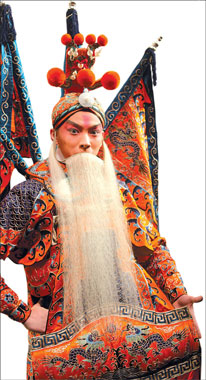|

|
|
Tan in his famous role as the "Bearded Man". Yang Shizhong |
Tan Zhengyan's fate was determined before he was even born.
"I was born to learn Peking Opera," says the only offspring of the Tan school masters. "There was no other choice."
Peking Opera has been the family's only profession for seven generations, and during the past 200 years the family has provided some of the most important figures in the history of this Chinese cultural treasure: Tan Xinpei, the founder of the Tan school; Tan Fuying, one of the four great "Bearded Man" actors in the middle of the last century; Tan Yuanshou, a well-known actor who used to lead popular model operas during the "cultural revolution" (1966-76), and Tan Xiaozeng, today's established Tan school inheritor.
Now the torch is being passed to 29-year-old Tan Zhengyan. Blessed with a good voice and being the only son in his family, he grew up under great expectations to maintain the family's tradition.
"I like cross-talking, painting, playing guqin (a traditional musical instrument), football, tennis and ping-pong but not singing Peking Opera," he admits.
Peking Opera is experiencing a severe downturn, with smaller audiences and a shrinking market.
It has therefore become a less attractive career for young people in China, even for many children of Peking Opera masters.
Mei Wei, the great-grandson of Mei Lanfang, the founder of the Mei school, devotes most of his time to rock music instead, while Qiu Yun, the daughter of Qiu school founder Qiu Shengyun, has never received professional Peking Opera training because "it is too hard now to be a successful Peking Opera actor".
The youngest Tan is facing the same dilemma. "I live like a monk," he once complained to his parents. He is not allowed to smoke or drink alcohol and is even meant to avoid spicy food. All that, plus at least four hours a day learning and practicing the art.
"I have learned Peking Opera since the age of 10 and done my best to practice and perform, but still there are many flaws in my shows," he says.
He says he recently performed poorly many times and was sharply criticized by the audience and although he feels he has since improved, he still has doubts. "I may never surpass my forefathers, even though I have devoted all my life to improving," he says.
What troubles Tan even more is that his grandfather has been urging him to get married and produce a child as soon as possible, to ensure Peking Opera makes it into the family's eighth generation.
Moreover, his base pay at Beijing Peking Opera Theater is only a few hundred yuan per month. "In the past, the income of my grandfather alone could easily support a big family, but now even a first-rate Peking Opera actor finds it hard to raise a family," he says.
Nevertheless, his family still insists on Tan sticking to the job. "It is like an arranged marriage. What I am doing now is trying to fall in love with it," he laments.
To avoid the strict supervision of his parents, the young man has moved into a rented apartment by himself. "If I don't walk upright at home, my father scolds me, and when I cough or yawn, my mother criticizes me for not using the correct pronunciation," he says.
Tan described his family as "madmen" for Peking Opera. Tan says his 83-year-old grandfather, Tan Yuanshou, still performs and caused a shock by having cosmetic surgery to make himself look younger "because he thinks that the wrinkles and big eye bags have a bad impact on his stage image".
He is quite daunted by his grandfather, who is quite strict on him when it comes to Peking Opera training. "He seldom praises me. The highest praise I have ever got from him is 'just so-so'," the young man says. "But I know from my mother that, in fact, my grandpa is quite satisfied."
Although Tan fulfills his family's wishes by maintaining the Peking Opera tradition, he has his own ideas about developing it and has performed with a top Japanese jazz band. The shows, at the traditional Dong Yuan Peking Opera Theater in Changpuhe Park, have attracted many young fans.
Even his parents, though strongly opposed at first, are now supportive. "But grandpa has said nothing about it," he says. "I know he is unhappy to find me changing the tradition."
Tan's biggest wish is to enter the TV and movie industry and with his good looks and tall and strong body, he is confident he can get a breakthrough but there is an ulterior motive. "It is only a short cut to promote Peking Opera," he confesses. "When I make a name for myself in TV and movies, I can influence more people to appreciate Peking Opera and do something for the age-old art.
"For instance, if Jackie Chan were a Peking Opera actor, I believe most of his fans would be interested in watching his Peking Opera shows."
For now, though, he is excitedly preparing a new opera Six Chapters of a Floating Life, which will premiere in September. Unlike traditional Peking Opera, the new show will have many innovations. For instance, Chinese folk song rhythms are added in the accompaniment and modern dance is also blended into the show.
Tan, who will play the leading role, has been given the freedom to build the character as he sees fit. "At last I can get away from the Tan school characters and have a role of my own," he says. There was finally a hint of a smile.
(China Daily? August 22,2008)